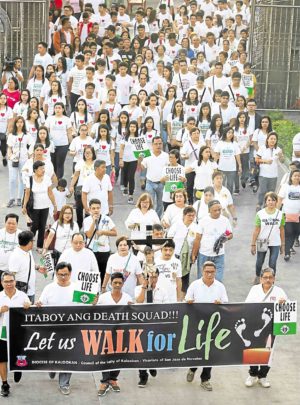Priest to ‘invisible’ killers: God knows who you are

Participants in Sunday’s “Walk for Life” condemn the almost daily killings in Caloocan, Navotas and Malabon. —NIÑO JESUS ORBETA
An outspoken bishop on Sunday expressed disappointment over the government’s war on drugs which targeted only the poor or small-time drug suspects instead of big and powerful drug cartels.
Bishop Pablo Virgilio David, head of the Diocese of Kalookan which covers the cities of Caloocan, Malabon and Navotas, said he thought the drug war in the country would be the same as Mexico’s where government forces clash with major drug cartels.
“But has our government identified even just one of the cartels here in our country? If this is a war, who is the enemy? Why is it that only the poor or ordinary people end up being the victims?” he asked.
Earlier in the day, David led a “Walk for Life” activity at San Ildefonso Parish Church in Navotas City, to denounce the growing number of extrajudicial killings in the diocese. Around 1,000 people participated, including students, parishioners, lay people and religious leaders.
“We’re hoping that the Walk for Life will communicate a strong message to the killers. We’re monitoring them. We are documenting their moves and their victims. God knows who they are. I hope they know that what they’re doing is unjustifiable in any civilized society. We will not allow them to continue terrorizing our communities. We’re asking our police not to allow their reputation as law enforcers to be tainted by these people who use lawless means in dealing with criminality,” David told the Inquirer.
He later celebrated Mass at San Jose de Navotas Parish where he lamented how gunmen in ski masks and on motorcycles have been killing off residents of Caloocan, Malabon and Navotas every day. Yet, the killers go unpunished and unseen by government officials, David said.
“Crimes like theft and bag snatching — these are seen on closed circuit television cameras. But the murders, the people who abduct and kill the helpless, these are not seen on CCTV cameras. Why is that? Are they invisible?” he asked.
Daily killings in Navotas
“They kill daily. In Navotas alone, they killed about 30 people in a span of three weeks. Sometimes they kill in groups. They move from one place to another and yet the police fail to arrest them. The barangay tanod (watchmen) fail to see them despite the surveillance cameras,” David said.
He likened to termites the people behind the killings. “Houses are not the only ones being attacked by termites, but also our society. Like today, the killers are with us here in Navotas, Caloocan and Malabon,” he added.
In April, the bishop presided over the funeral Mass for Raymart Siapo, a disabled teenager from Barangay NBBS, Navotas City, who was killed by men in bonnets a day after a neighbor accused him of selling drugs.
In his homily, David had then called on authorities to solve all incidents of extrajudicial killings, dubbed recently by policemen as death under investigation cases.
At Mass yesterday, the bishop posed the same question he had asked at Siapo’s funeral: “Has any of these cases been solved? Even just one?”
He also questioned the way drug-related killings were being handled by authorities. “They say they know the victims were drug suspects because their names have long been on the drug watch list. As if this meant that the case was closed. Or that it was okay for them to be killed because they were addicts or pushers,” he said.
“Let us come together and condemn the extrajudicial killings in our diocese, especially in Navotas,” David added.
According to him, he understands if witnesses refuse to testify against the killers out of fear although he reminded them of the importance of standing up for others.
“This is why we are here. Let’s not allow these sacred and holy lives created by God to end up as statistics. Until now, some corpses in the mortuary remain unidentified. They don’t have names that is why they are just part of the statistics in the war on drugs,” he said. —With a report from Tina G. Santos